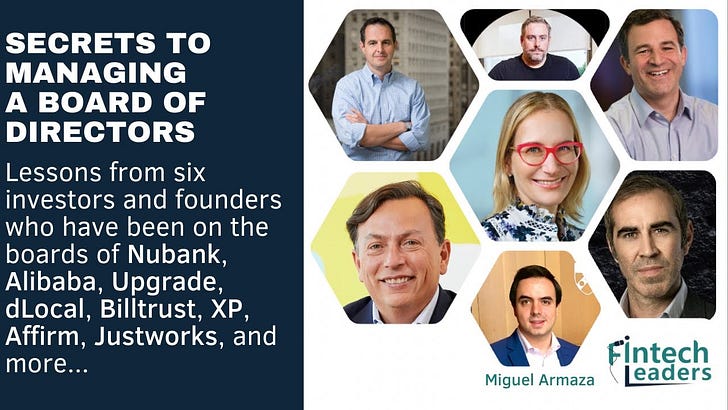This article is part of Fintech Leaders, a newsletter with almost 60,000 dreamers, entrepreneurs, investors, and students of financial services. I invite you to share and sign up! And, if you enjoy this conversation, please consider leaving a review on Apple Podcasts, Spotify, or wherever you get your shows so more people can learn from it.
I sit down with Gary Hoberman, CEO & Founder of Unqork, a revolutionary technology company that has pioneered a Codeless as a Service (CaaS) platform to help eliminate legacy code for enterprises.
Launched in 2017, Unqork’s clients include some of the largest banks and insurance companies in the world, and the company was last valued at $2 billion having raised $350+ million from Google, Goldman Sachs, Aquiline, Fin Capital, Blackrock, and many more.
Prior to founding Unqork, Gary was Global CIO for MetLife, where he oversaw technology across 47 countries, and before that he was one of the youngest Managing Directors in Citi’s history. He holds seven patents, six of which are still in use in the finance industry today.
In this episode, we discuss:
The crisis in the world of enterprise software and why most of the dollars being spent are making companies worse, not better.
“I left the world of software on the corporate side, because every dollar I was spending was making the company worse.”
Gary Hoberman has been a technologist his entire life. Born and raised in New York City, he began his career in Wall Street, focusing on systems and tech. Over time, he transitioned to roles of increasing responsibility, including many years at Citigroup, where he was eventually responsible for managing the company’s top engineers and influencing $9 billion in annual spend. His last corporate role was Global Co-CIO at MetLife, where he oversaw an extensive team of 10,000 engineers across 47 countries with a budget of 1.2 billion annually.
Hoberman’s career made him intimately familiar with the issues faced by corporate tech leaders. In fact, his motivation to launch Unqork was fueled after realizing how increased technological investments were paradoxically creating future problems for his organizations. Unqork was launched to fundamentally change the trajectory of how technology impacts businesses. They introduced a new category called "codeless" that prioritizes making businesses better off after software creation that aims to produce "future-proof" software. The essence is to ensure software is sustainable and won't become a future liability.
Why Unqork believes that launching software isn't the final goal, but instead we should focus on ensuring software improves businesses and doesn't become a legacy burden.
According to Gary, traditional low-code/no-code software solutions, dominated by older companies, focus on speeding up the software creation process but often neglect the quality of the code, leaving businesses in a worse state after implementation. Unqork believes that launching software isn't the final goal; ensuring that the software doesn't become a legacy burden and instead improves the business is vital. They have pioneered a "codeless" approach to software, transforming every aspect of traditional software development into understandable data. Instead of traditional code, businesses describe their needs using pure data, making it accessible for anyone to understand, read, and write. This concept democratizes the creation and understanding of software systems.
Challenges with the conventional approach towards cybersecurity and why most companies are not equipped to manage truly secure operations.
“Security is a fallacy. We tell the regulator's we're secure; we tell the customers we're secure, because we run a pen test once a year. The reality is, you would have to pen test every one of your applications every single day of the week, every day of the week. So 365 days a year, you have to run a pen test on every one of the applications.”
Unqork is challenging the conventional approach of running penetration tests (pen tests) once a year. Truly secure operations would require daily tests and fixes across all applications, a resource-intensive proposition that most companies cannot manage. The current system essentially provides a false sense of security, as companies attest to being secure based on these infrequent tests, while in reality, achieving such security is far more complex and resource-intensive.
In turn, Unqork operates cloud-agnostically, ensuring businesses are not dependent on one cloud provider. This approach also enhances security as everyone is on the same codebase maintained by Uncork. The repeated pen-testing from various enterprises ensures heightened security for all clients. The unified approach means that vulnerabilities found and fixed for one client benefit all, and the infrastructure is adaptable even with future advancements like quantum computing.
Persevering in the face of adversity, turning 300 no’s from Investors into a $2B company… and a lot more!
“We heard 300 ‘No’s’ from every single investor. As to why this won't work. Why will the idea won't work. But the problem is, I've lived and breathed that. My team lived and breathed it. We know it. So with an amazing leadership team, I self funded that journey. And there was no funding. There was sleeping on a couch for a full year during its kickoff.”
Want more podcast episodes? Join me and follow Fintech Leaders today on Apple, Spotify, or your favorite podcast app for weekly conversations with today’s global leaders that will dominate the 21st century in fintech, business, and beyond.
Previous Episodes You May Enjoy:
Video Highlights You Will Definitely Like:
Miguel Armaza is Co-Founder & Managing General Partner of Gilgamesh Ventures, a seed-stage investment fund focused on fintech in the Americas. He also hosts and writes the Fintech Leaders podcast and newsletter.


























Share this post